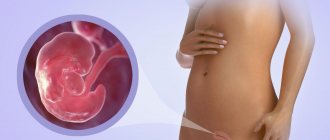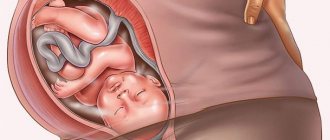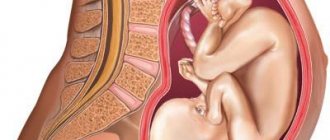15 weeks of pregnancy is how many months? - you are already three months and two weeks pregnant. Your morning sickness will disappear and you'll feel more energized to get things done. At 15 weeks of pregnancy, the belly will become more noticeable. The 15th obstetric week of pregnancy differs from the usual one, since gynecologists count from the date of the last menstruation.
Features of the 15th (obstetric) week
By this time, the woman’s white line of the abdomen is colored, and now a dark pigment strip runs from the navel to the pubis. The halos around the nipples also become pigmented, becoming darker and darker every week.
At the 15th week of pregnancy, certain sensations in the stomach are already observed. True, many people mistake the first movement of the fetus for intestinal movement. And only after a series of repeated sensations within oneself, an understanding of what is happening comes.
Manifestations of absent-mindedness, lack of concentration and forgetfulness in women during this period are very common. But, unlike the previous week, the woman feels a new surge of strength and energy. Many argue that during this period not only toxicosis “releases”, but completely new family relationships develop . And in general, this time is equated with blossoming in everything - in relationships with your spouse, others, friends and enemies. Some argue that it is during the second trimester that a rainbow “settles” inside a pregnant woman.
Fetal development and pregnancy development at 15 weeks
The fetus is no longer an embryo. Its weight reaches 50-70 g, its height from the coccyx to the crown of the head is 10 cm, and the brain has increased to the size of a walnut. The main receptors are turned on. By this period, the cerebellum and spine had already formed.
The placenta began to work at full capacity and took over the feto- and utero-placental blood circulation, thereby stopping the free blood exchange from mother to fetus. The fetal circulatory system is almost formed . She also got involved in the work, and a pulsation of blood flow is observed through the thin skin. The heart rate is 150-160 beats/min. From the 15th week, the pigment-producing mechanism starts.
It is at the fifteenth week that the sweat, sebaceous glands, taste buds are formed and the swallowing reflex appears. During this period, the rudiments of the lungs appear. Only instead of air, the fetus draws in not air, but amniotic fluid, which enters the respiratory lung sacs, simulating breathing.
The nervous system continues to form. And a characteristic feature is the reaction to light. During an ultrasound examination, a fetal reaction is observed in response to a switched-on flashlight brought to the abdomen . The baby begins to “hide” from the source of irritation - a ray of light.
The fetus begins to move inside the womb at 6-7 weeks. But at the 15th week of pregnancy, you may not feel the fetus moving, but it is already possible to determine the sex of the child at this time. True, errors cannot be ruled out, but in 75% of cases, the data is practically reliable.
The entire second trimester is characterized by an increase in the vital activity of the fetus - it actively gains weight and quickly increases in size. Its size can be compared to a large orange . The fetal legs “stretch” and become longer than the arms, which, in turn, begin to bend better at the elbows, and the legs at the knees. The fetus's eyes are still closed.
How does a child change?
Fetal development occurs at a tremendous pace. All organs and systems have already been formed and continue to improve. The most important metamorphoses in the body of the unborn child are:
- Activation of endocrine cells of the pituitary gland. It begins to produce the first portions of growth hormone, which additionally stimulates the increase in all anatomical structures in the baby’s body.
- The cerebral cortex is developing more and more. The central nervous system of the fetus gradually begins to play a leading role in the regulation of all endogenous processes.
- Almost all endocrine glands are activated.
- The gallbladder begins to perform its main function.
- The sebaceous and sweat glands work fully.
- More and more hair appears on the surface of the head.
- The fetal heart pumps approximately 23-25 liters of blood daily.
- The liver assumes the function of the main digestive organ.
- The baby's auditory system is almost completely finished developing. Mom can start talking to him.
Limbs gradually increase in size. The child is actively growing. The 15th week of pregnancy is the period when the baby’s weight is about 70 grams and body length is 16 centimeters. In some manuals for expectant mothers, you can find a description of the fetus that compares it to a ripe orange.
At this stage, the formation of the external genital organs ends. It is already possible to determine the Rh factor and blood type of the baby. It depends on the presence of special proteins in the blood plasma attached to the membrane of red blood cells.
What happens to a woman at 15 weeks of pregnancy
In the second trimester, significant changes are observed in a woman’s body.
- almost doubles .
- The pulse and breathing increase significantly. Shortness of breath may occur, but such changes are considered normal.
- Symptoms of rhinitis in pregnant women are quite common . In some cases, nosebleeds may occur. They are associated with the functioning of the vascular system and an increase in hormonal levels - estrogen production.
- Pregnant women are more susceptible to allergic reactions to a wide variety of irritants. If you experience burning, itching or rashes on the skin along with a runny nose during pregnancy, you should consult your family doctor.
- The immune system also undergoes changes , and makes the body more susceptible to various types of infections, be it influenza or ARVI.
- An increase in vascular permeability in the second trimester of pregnancy can cause bleeding gums.
- It is from the 15th week that pregnant women's teeth begin to crumble . This is due to the consumption of calcium by the fetus, which takes nutrients and trace elements from the mother’s body.
At the 15th obstetric week of pregnancy, the belly may already be visible . Its growth is observed from the 14th to the 15th week. But for a woman giving birth for the first time, the tummy may be only slightly noticeable. This characteristic of appearance is extremely individual, as is the psychological portrait of any pregnant woman.
Psychologists in 25% of cases note sudden mood swings, tearfulness and even hysteria in pregnant women. Also characteristic is a change in taste , which is also associated with the interesting position of the expectant mother. Your favorite food can cause disgust, but your least favorite dish will be eaten with pleasure three times a day. But this phenomenon is temporary and, as a rule, disappears with the birth of the child. The ideal weight gain for a pregnant woman by this time is 2-3 kilograms.
The changes occurring in the body sometimes frighten young and inexperienced expectant mothers. So, the reason why the lower abdomen feels tight at 15 weeks of pregnancy can be caused by a constantly and continuously growing uterus. The muscles that support the organ are also involved, being in constant tone. They cause unobtrusive, mild pain in the lower abdomen, but do not cause, other than mild discomfort, any other troubles.
Cramping pain radiating to the lumbar region, accompanied by bloody discharge at the 15th week of pregnancy, is considered by gynecologists as an existing threat of spontaneous abortion - miscarriage. With such a symptom, you should urgently contact the antenatal clinic.
Colorless, copious discharge of a liquid consistency is a completely normal phenomenon for this period, and is explained by changes in hormonal levels with the active production of estrogen. Immediate consultation with a doctor is required if the discharge becomes uncharacteristic:
- with an unpleasant fishy odor;
- unusual consistency - cheesy, bubbly, or heterogeneous substance;
- discoloration into yellow, green or purulent spectrum, leaving dirty marks on underwear;
- accompanied by painful sensations or burning when urinating.
When your lower back hurts at 15 weeks of pregnancy, you also need to consult an obstetrician-gynecologist . Such symptoms are often associated with pathology of the kidneys and/or urinary system, especially if the body temperature is elevated to low-grade levels. During this period, pain in the tailbone may already appear. It is associated with the uterus pressing on the sacrum and partial infringement of the nerve ganglion.
Recommendations
Pay attention to your weight
. Now it must be strictly controlled. If you have gained more than 3 kg of your previous weight by 15 weeks, then reconsider your diet. It is clear that you are now eating for two, then being overweight and obese are not the best companions for a pregnant woman. In the future, the extra pounds will result in quite serious problems: shortness of breath will appear, there will be severe swelling of the limbs.
Agree, there is often a situation when a pregnant woman wants to eat something like that. Even those products that previously did not evoke sympathy. Pay attention to this. Perhaps your body is signaling that it is missing some substances and needs to replenish its reserves.
It's time to sign up for special courses at the 15th week of pregnancy and start preparing for childbirth
. Is it too early? Not at all. After all, this is not only learning the correct behavior during childbirth, but also gradually tuning yourself to this process, getting rid of feelings of fear and tension.
Prohibitions and contraindications during pregnancy
As has been said more than once, bad habits
, contact with chemicals. Avoid stressful situations as much as possible, because now your baby is very sensitive to the mother’s condition. And not only physical, but also emotional. Therefore, only positive emotions, a healthy lifestyle and good nutrition.
Physical fatigue and lack of sleep are also harmful. Remember, now nothing is more important than your child, so take care of your health and condition of body and soul.
Diet
very important at this time. Mommy now eats for two, because the fetus needs a complete set of all vitamins, microelements and nutrients for normal growth and development. Even if you are a vegetarian, you will have to change your principles during pregnancy. Substances in meat cannot be replenished with drugs from the pharmacy. But sitting on solid vegetables can lead to anemia and other troubles. So give birth and return to your favorite cabbage leaves and zucchini.
Sex at 15 weeks pregnant
There are no restrictions in intimate life now. A ban can only be in the presence of any serious abnormalities during pregnancy: threat of miscarriage, placenta previa, infectious diseases.
There is no need to be afraid that the uterus contracts during sex. These decorations will not pose any threat to the baby.
But feelings and emotions can be very vivid, such as you had never experienced before pregnancy. This is due to the fact that the hormonal background of the body has changed greatly.
Sports and physical education
Courses for pregnant women, yoga, fitness, special gymnastics, swimming pool - as you can see, the choice is wide. The main thing is that physical exercise does not cause overwork. It is not possible to attend these events, then just take walks in the fresh air every day.
Vitamins and medications at 15 weeks of pregnancy
If you or your doctor think that you are not getting the required amount of vitamins from food, then it is quite possible to take special multivitamin complexes. Elevit is usually recommended
or
Vitrum
.
Be careful (or better yet, don’t take any risks) with folk remedies in the form of herbal infusions and decoctions. The properties of plants have not been fully studied, and grandmother’s advice may not always benefit you. For example, hibiscus and St. John's wort, which are useful for the normal body, can cause a miscarriage in a pregnant woman.
Visiting doctors
As a rule, an ultrasound scan at the 15th week of pregnancy is not the first time for an expectant mother. It is very interesting for a pregnant woman to have an ultrasound examination of the fetus in 3D format, where the location of the fetus can be viewed in three-dimensional space and the activity of the fetus can be observed - the movements of its limbs, the work of the heart muscle.
In the second trimester, a triple test (screening) is mandatory , a vaginal smear is taken, and the hCG level is determined. Deviation from the norm in an increase or decrease in the indicators of the last analysis can indicate pathologies occurring in the womb.
Mom's belly
The uterus rises more and more from the pelvic cavity - the expectant mother’s belly continues to grow. However, it happens that it becomes noticeable only now. This is absolutely normal! If a woman is pregnant for the first time, her belly, as a rule, begins to round later and at 15 weeks differs from the belly of a pregnant woman who already has children.
What should alert the expectant mother is pain in the lower abdomen during pregnancy - now they can be a sign of increased uterine tone, and in some cases, placental abruption. Be sure to consult your doctor. But don't panic ahead of time! Often, pain occurs due to problems with the intestines or sprains of the ligaments and muscles that support the growing uterus.
Possible deviations from the norm
- Bleeding is a clear sign of a pregnancy threat.
- Frozen pregnancy is accompanied by a severe form of intoxication, aching pain in the lower abdomen, tachycardia and extremely high body temperature.
- Genetic heredity - the risk of giving birth to a child with cerebral palsy or Down's disease is determined by triple prenatal screening, sequentially carried out in three trimesters of pregnancy.
Lifestyle
If a pregnant woman is underweight or overweight, she needs to count the number of calories consumed, reducing or increasing the caloric content of food consumed, depending on the symptoms.
Starting from the second trimester, weather-sensitive pregnant women need to monitor their blood pressure. If you have hypertension, you need to limit your salt intake. Hypotonic patients need to drink the discharge in the morning at 15 weeks of pregnancy and have a cup of sweet tea with cookies. Both one and the other can lead to a restriction in the fetus’s access to oxygen.
As a result of hormonal changes, not only the character deteriorates, but also the skin - it becomes dry . Special soaps and moisturizers can solve this problem. As a rule, by the third trimester such phenomena disappear, even if acne has appeared on the face and chest. A timely visit to a dermatologist will prevent temporary changes from worsening. Therefore, it is better to leave excessive use of cosmetics for the postpartum period.
The simplest measures taken when carrying a child in the summer are safety glasses and humidifiers. In winter - rich cream, warmth for the feet and high-calorie food.
There is absolutely no justification for refusing sex in the second trimester of pregnancy. There is not a single objective reason to reduce sexual relationships with a partner to “no”.
Symptoms of 14 15 weeks of pregnancy
Week 15 of pregnancy: You now have more energy and feel the same as before pregnancy, which is great, but your body is constantly changing. Pay attention to any new pregnancy symptoms so you can discuss them with your doctor. Right now, you may be experiencing dizziness, gas, heartburn, or an upset stomach, as well as the following symptoms.
Below is 15 weeks pregnant belly photo:
Weight gain
Typically, the recommended weight gain throughout pregnancy is only 11 to 15 kilograms. Depending on your body mass index (BMI) before pregnancy, your overall weight gain may be higher if you are underweight.
Be sure to eat healthy and not just for two! Weight gain can lead to complications during pregnancy, such as gestational diabetes and preeclampsia, which can compromise the health of you and your baby.
Changes in sexual desire
Sex during pregnancy does not cause miscarriage. However, if you have a history of early labor or miscarriage, we strongly recommend that you speak with your doctor. If you are unable to have sex or have a low libido, talk to your doctor about any health concerns you have and remember that intimacy can happen without sex.
Swollen or bleeding gums
You may notice red, swollen gums or small bumps on your gums. Due to hormones (of course!) Pregnant women are more prone to gingivitis or bleeding gums when brushing or flossing. Some also report problems such as brittle teeth, tooth sensitivity, toothaches, and even tooth loss. Gingivitis can quickly develop into a bone infection, which has been linked to preeclampsia and preterm birth.
Dyspnea
Your uterus grows and remodels your organs located in your abdomen, so your lungs may not have room to expand enough to take a full breath. You may have more energy now compared to your first trimester, but your body is still working overtime to produce more blood and support your pregnancy.
Memory problems
This refers to the small bouts of forgetfulness that pregnant women have (15 to 15), and it's real since brain cell volume actually decreases during pregnancy. To combat this, write down or use an app to set reminders and make sure you get quality sleep!
Change in skin color
Your skin also changes much more than your areola. Expect some darkening of the neck area, armpits, and eventually the appearance of a dark vertical line on the abdomen, known as linea negra. Women are also known to experience irregular changes in skin color on the face, around the eyes, nose and cheeks.
Phlebeurysm
Your body is constantly producing more blood, and your veins are working extra hard to deliver blood and oxygen to your baby and other parts of your body. You may see visible veins on the chest and abdomen. However, varicose veins may appear on the legs and feet, which can also be associated with weight gain.
To prevent varicose veins from getting worse, always wear comfortable shoes to reduce stress on your feet. Stay active to improve your circulation and watch your weight. Using compression socks or support tights may also help.
Below 15 weeks of pregnancy, fetal size ultrasound photo:
Physical activity and exercises for pregnant women
If the work of a pregnant woman involves physical stress on the body, in the second trimester it is simply necessary to increase the caloric content of food by 10-15% . If you have a sedentary lifestyle, you need to review your diet and introduce low-calorie foods into it, and you also need to do gymnastics for pregnant women, if there are no medical contraindications.
A wonderful set of exercises for pregnant women in the second trimester from Masha Efrosinina.
Recommendations for a pregnant woman
- From the second trimester, you can maintain contact with your baby - communicate, talk to him, tell stories, sing lullabies.
- Don't force yourself to eat something you don't want , even if it is an extremely healthy dish. If it disgusts you, the product will not be beneficial.
- If the digestive system malfunctions, you should adhere to a gentle diet , eat often and very little.
- The basis of good health in any trimester of pregnancy is complete and quality sleep !
Potential negative factors
Despite the full activity of the placenta and high-quality protection of the fetus, there are a number of substances that easily penetrate the baby’s body and significantly affect its development. The following are prohibited during pregnancy:
- Alcohol. It is a cellular poison, disrupting the development of the fetus. With regular use, alcoholic fetopathy may develop.
- Nicotine. Remains one of the most powerful vasoconstrictors. Under its influence, oxygen starvation of the child is formed, which leads to disruption of its adequate growth and development. In addition, nicotine already in the womb causes primary addiction in the body. After birth, the child experiences a real “withdrawal”, which is manifested by the instability of his psychological state.
- Opiates and other drugs. They lead to the formation of a persistent dependence of the child’s body on these substances and significantly inhibit the development of the central nervous system.
- Tetracycline antibiotics. They negatively affect the condition of the baby’s teeth and hearing system.
The expectant mother must constantly monitor herself and what she eats and takes.
And one more thing about the “interesting situation”
- Be sure to read where the “pitfalls” are hidden, how it proceeds and how the 14th week of pregnancy differs from the overall picture. Why is it so important to do an ultrasound and test the first screening at this time?
- Find out at what week of pregnancy the belly begins to grow, although such a characteristic as an increase in the abdomen is purely individual and often depends on many factors - the figure, skeletal configuration, number of births and other parameters of the expectant mother.
- You will also find the answer to how often you can do an ultrasound during pregnancy. Take a thorough look at our portal for mothers and you will receive many answers to your questions.
- Also find out which periods are considered the most dangerous weeks of pregnancy. What preconditions can cause irreversible consequences, and how to avoid them.
- What should the tone of the uterus be during pregnancy, what leads to a decrease and increase in tone, and what this entails.
I invite you to a discussion so that you can share your experience of carrying and giving birth to a child. Please leave your memories of the events you experienced at the bottom of the article. Your comments and feedback will help other expectant mothers form a clear understanding of the most important period in the life of every woman and prepare perfectly for the upcoming birth.
Possible problems
Problems in the second trimester appear due to hormonal and physiological changes in the body
Stomach ache
Due to the increase in the size of the uterus, pulling pain in the abdomen occurs. These symptoms should not cause concern; the abdominal organs adapt to the new position. The reason to consult a doctor is cramping pain. By themselves or accompanied by bleeding. Signs indicate a threat of termination of pregnancy. Sometimes pain and discharge are a variant of the norm, it all depends on the characteristics of the pregnant woman’s body.
Lower back pain
Nagging pain in the lower back should not be a cause for concern. Most often they arise due to redistribution of the load on the body . To alleviate the condition, gynecologists recommend avoiding prolonged sitting on soft chairs, getting up more often, stretching, and doing gymnastics.
Pathology is indicated only by severe, continuous or shooting pain. A specialist can diagnose a pinched nerve or displaced organs.
Bleeding
Bleeding of any intensity during pregnancy should prompt immediate medical attention , if possible. If you know that you will have to wait in the general queue, then call an ambulance or go directly to the hospital.
ATTENTION! Bleeding harms the expectant mother and baby.
Possible causes of bleeding:
- placental abruption (impairs the supply of oxygen and nutrients to the fetus, stopping the baby’s development and spontaneous miscarriage are possible);
- sexual infection of the mother (in addition to miscarriage, there is a risk of infection of the fetus);
- low progesterone levels;
- stress;
- inflammation of the cervix.
All of the above pathologies can cause separation of the placenta from the body of the uterus. Timely diagnosis and therapy will help maintain pregnancy. The expectant mother is undergoing examination in the hospital. The gynecologist examines her and prescribes additional tests and studies:
- blood test (general, biochemical, hormones, infections);
- stool and urine tests;
- smear for the presence of sexually transmitted infections;
- Ultrasound of the fetus and pelvic organs.











